When you're a gaping media slut like myself, every so often it's beneficial to hit up Amazon and take a gander at the next month or so of releases before their time has come. It makes things easier, it helps determine budgets, and it lets you know what weeks or months are going to get grizzly. Occasionally, when I go about this I load up my Amazon Wish List (Well, I always load up my Amazon Wish List), but occasionally I load it up with some interesting DVDs that I would have otherwise missed. One of the most popular sort of DVDs that snakes its way into my view that wasn't otherwise present, are home releases of interesting PBS programs. Not to mention, cheesy 60s softcore porn, but that's another beast altogether. PBS has always been releasing their programs onto video, they do need the money being public and all, but now that they're on DVD, every so often a program that I missed will seem infinitely interesting.
The problem is that the DVDs aren't widely bought, and therefore don't really have the opportunity to drop in price like I enjoy my DVDs to do. The used market just isn't there. The first video to come into my view was The Question of God: Sigmund Freud and C.S. Lewis, and I was always forced to pass because the price seemed prohibitive. (Looking now it has dropped somewhat, but perhaps not enough for the quality or nature of what it is.)
Recently, in conjunction with my interest in nutrition and weight loss I noticed another program while scouring releases, it was: FAT: What No One Is Telling You. This DVD has been in my Wish List for a while now, but I was really tempted to buy it. Before I did though, I wanted to at least see if I could find a trailer or commercial. Skipping Youtube and going straight to PBS's website, I found a little more than I bargained for.
It seems PBS is generous enough to offer the majority of their developed programs on their website not only in trailers, but also in almost their entirety. The Question of God is available in full, but not entirely in video, as some aspects of the program are transcript only. Regardless, that's awesome for the dead broke like myself. FAT: What No One Is Telling You was, as far as I can tell, available in its entirety, and I've watched it all. It paints a pretty grim picture for those trying to lose weight, so I'm not sure how I felt about the program after watching.
They don't suggest anything is impossible, just insanely difficult once you get so far beyond normal weight. I've lost 21 pounds in the last two months, so let's hope I can keep beating the odds and reach my goal with only 14 more pounds to go. Anyways, a TON of other programs are available for free on PBS's website, proving once again that the best things in life are free. If you're entertained by the occasional intelligent program (You should be!) instead of ... say, surfing Youtube for stupid videos, then by all means, get over to PBS and partake in the goods while they're available.
Not that I'm trying to commit to posting more than once a day, or a week for that matter, but this was just too cool not to share.
That genuinely creepy face is apparently that of Heath Ledger, starring as the Joker in the upcoming Batman movie. It was revealed in a roundabout ARG sort-of-way through a website. I'll let Twitch explain the details, as they're where I found this.
It's hard to say this, but I was never desperately in love with the old Batman movies. Maybe I don't dig the character as much as other people, or maybe the original movies were spoiled by what came after, but Batman doesn't excite me as much as many others. Regardless, I would never suggest that Nicholson as the Joker was anything other than fan-fucking-tastic, so Heath Ledger obviously has some big shoes to fill. This image proves that at least they're walking down a very dark and stylish road with the character, and if the acting is to match, I'm already excited.
God damn, I looked at it again, and that is just one creepy looking Joker. Good stuff indeed!
The advertisements littered on the many gaming sites I often frequent beckoned that I participate in a 10-day free trial for The World of Warcraft: Burning Crusade expansion. It didn't take much convincing for me to cave in and start the lengthy download, so after nearly a day and 2 Gigabytes later I was back in Azeroth, somewhere I never thought I'd explore again. It's not that I was ever an addict, or that I'm against WoW in general, it's just that after passing on Burning Crusade at launch, I imagined there wasn't going to be much else that would pull me back into the game. Sure, the next expansion might be exciting, but the entire idea of expansions bothers me enough that I thought I'd stay away.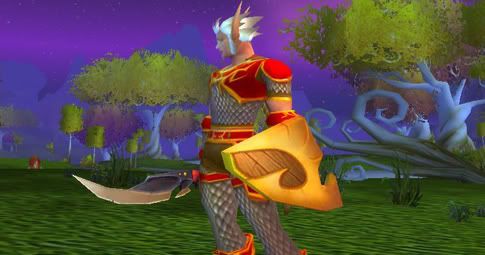
That's one ridiculously cool level 5 character, at least more so than other WoW races.
The nature of the expansion is to provide additional content for gamers who have largely explored the entirety of what is currently available, and also to provide a new starting grounds, races, classes, etc. for those who haven't yet played the game. I was neither, resting comfortably in the middle grounds, with a level 35-ish character on a server that none of my friends played on. The real problem with expansions, I think, is that they're a constant pouring out of content that is largely improved over the initial game, streamlined and made to look more appealing, and in some way, that has to be offending to the player that has already expired the original game. A player that spent the necessary time to reach level 60 with a particular race now finds two new races, in this case the Blood Elves and the Draenei, that he honestly may find more appealing than what he was offered when he started the game. So, he's forced with asking whether he would like to maintain his current character in the face of more appealing choices, or sacrifice the (very literally) days of effort that it took to create that character. That's a poor choice to inflict upon people.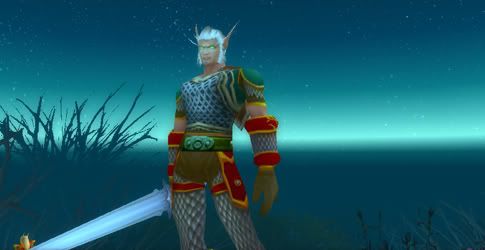
At around level 15 I had to take the Christmas colors to keep up with the best available gear.
Regardless of my stance on expansions in general, the new starting areas in the Burning Crusade were alluring. I haven't had the chance yet to explore that of the Draenei, but I have seen the screens, and it's hard to argue how much more visually appealing it is in comparison to Elwynn Forest and similar early level areas in the original content. I haven't faced anything along the lines of Westfall, and that's a very good thing. The Blood Elves area is insanely beautiful, and the forest area is lush and vibrant. I had originally wanted to spend my time exploring the Draenei, but this starting area, and the Blood Elf characters as well, looked so good that they swayed my opinion. That feeling never waned throughout the time I've been playing, and honestly, it's a little ridiculous. My Blood Elf character, Esperante, looks, in short, much cooler than my human character at nearly 35 levels higher. The starting equipment and weapons for the blood elves seem to have only one real goal, make the Horde look attractive. It wouldn't be brash to say, in my opinion, more attractive than that of the alliance.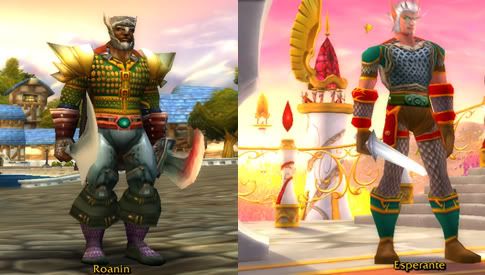
No doubt about it, my first character is an ugly rainbow bastard.
Another thing about the Blood Elves is that Blizzard seems to have honed in more on the mythology of Warcraft within the starting area itself, and that is something I'm glad to see. Other races within the game seemed so far from participating in the history of Prince Arthas and the Burning Legion that it could have largely been left out, but the Blood Elves and the Dead Scar within their homeland, as well as the Ghostlands, are very much intertwined with that history. The Dead Scar is a very awesome tear, splitting the lands of the Blood Elves in half, that was the land on which Arthas made his advance. Now, the land spits forth wraiths, zombies, and skeletons and is a very stark contrast to the beatiful forest surrounding it. The second area for the Blood Elves, the Ghostlands, is very akin to the Duskwood, as it is the land held in alliance by the Blood Elves and Undead, and is a front line in the war against the Legion. It's also an interesting contrast itself, moving from lush forest to dark and foreboding very quickly.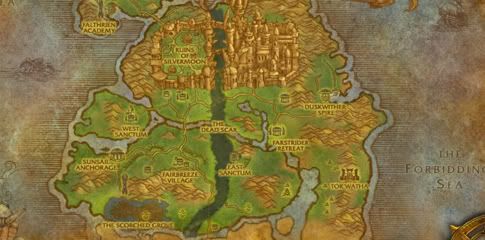
The Dead Scar is an insanely cool representation of Warcraft history within the game.
This whole post might be covering some fairly introductory topics, and considering that I'm genuinely late to the party here, this might sound a little silly, but I did have other directions in which I wanted to speak on World of Warcraft and MMO's in general. Perhaps though, I'll save those for another post, as they're fairly academic and deserve a broader focus than just World of Warcraft.
What I'm curious about, just to give an introduction, is what price do we pay for prolonged entertainment? In the case of MMO's in particular, what are we sacrificing for a game world that is apparently never-ending and loaded with replay value? This was inspired by a recent article I read about the human desire to seek happiness, and how it has, through drugs and science, reached an almost realistic position that happiness, under some other name, could soon be bottled. The cost of that is going to be large, and most people should stop to consider whether they're ready to live in a world in which we are all happy. Unhappiness, while not a very comfortable idea, is a very important part of why humans are still alive and thriving today. Using that same concept as the springboard to my discussion on MMO's, I'd like to ask, what is the cost of prolonged entertainment? Is it similar to that of prolonged happiness, and could it be that gaming, in general (as well as ourselves), is threatened by the game which never ends? Where, in all this, does the 15-hour game lie, and will it continue to exist?
Labels: Burning Crusade, Games, MMORPG, PC Games, Video Games, World of Warcraft
As I seem to have a frequent habit of doing, I've once again changed the layout here on The Zenspace. Know though, that this is still a work in progress, as I'm trying to implement a random image generator in my header image, and that's not very easy for the code lacking like myself.
It's the free and easy summer now, so expect me to get back to posting on a more regular basis. Specifically, stuff is in the pipeline about another conversation I had with XBLA, and trust me, that dude is nuts. From flailing drug addict to King of the Hill, XBLA is doing a good job at making me look like a douche for suggesting he's anything but awesome.
Also, Google ... he's still trying to get with me. It's really kind of scary.
For now though, and for the next post as well (it will be a Modojo writing update), I've got nothing. Nothing except this picture:
Seriously, has a better line ever been uttered? Pretty much everyone and their mother has accepted that we'll be seeing a new Starcraft game announced by Blizzard this week, be it Starcraft 2 or World of Starcraft. It's a damn shame though, because as good as Starcraft is, and as many entire nations as it can captivate, that doesn't make it Diablo. If it is World of Starcraft, expect quite the post from me on the entire MMO-affar. I have some ideas brewing.
Labels: Random
I'm sure that is a relief to most everyone that is actually visiting. Dystopia is cool, sure, but it can get a little ...meh... after the eighth or so consecutive novel. So, I can only imagine then what reading my poorly written blurbs on uncountable dystopian novels can be like. Chinese water torture, I'd imagine. We should all be pretty much stoked that this is all I covered in my dystopian literature course, as if there were more, I'd surely be absolving myself from returning to regular content. Alas, there are no more, and here I am, to return to posting about games and movies and the like. I hope I was missed. Before that though, I did ask for one more minute on books. See, today was quite the book day.
Working at a book store yields the occasional day that, for lack of a better term, could be called ... HOLY FREE FUCKING BOOK DAY! Today was that day ... strip day. Occasionally, we have too many copies of one book or another, they simply aren't selling, and when this occurs, specifically to mass market paperbacks, there are just too many for it to be cost effective to return them all to the publisher. Therefore, mass market paperbacks are stripped, the covers removed, and the bulk of the novels are trashed, or in our case, relegated to cardboard boxes and then picked clean by the vulture-like staff of a bookstore. A few strips here and there and you might get a good book to take home, if you're lucky enough to have done the strips or had someone tell you about them. Today, though, was a little different. We had 650 strips. Yeah, let it settle in. 650 books were headed to the dustbins today, mostly from fiction, but also mystery, romance, and science fiction, and to save them from their fate, they needed a hero, a reader of the greatest variety. They needed me.
So, scour the boxes I did, and goodness, look at my bounty.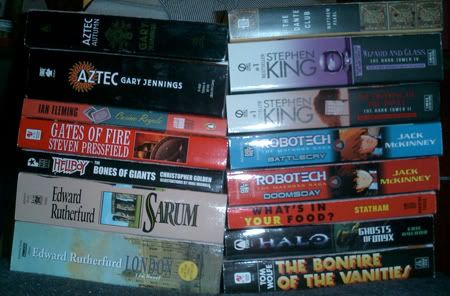
Nary a dent on 650, but there was (after I had already filled a bag, I found this out) a lightly suggested limit of 5 ... or so. I'm told this rule is definitely not enforced. That's probably good. Here's the lineup:
Aztec and Aztec Autumn by Gary Jennings - Supposedly great novelizations of Aztec fiction.
Casino Royale by Ian Flemming - I've never read 007, so why not start at the beginning?
Gates of Fire by Steven Pressfield - A very timely novelization of the battle of Thermopylae.
A Hellboy novelization that seemed interesting.
Sarum and London by Edward Rutherford - The suggestion of my cafe manager. Two large and daunting historical pieces of fiction.
The Dante Club by Matthew Pearl - A serial killer murders through Dante's Inferno.
Two books from the Dark Tower series by Steven King - I've been meaning to get on it all.
Two random Robotech novelizations that ... well, they were free. Come on.
What's In Your Food by ... Statham - It's a food guidebook ... again ... free.
Halo: Ghosts of Onyx by Eric Nylund - A totally pleasant surprise.
The Bonfire of the Vanities by Tom Wolfe - It was a movie, and it sounded familiar.
Not bad, eh? It's a little less cool when you realize the books all look like this: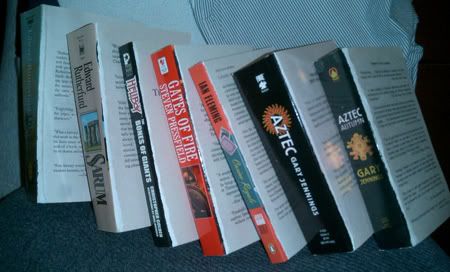
Obviously, with all of those books, my reading should be lined up all through the summer. Oh ... wait, I already had started the beginning of another mountain of books for the summer.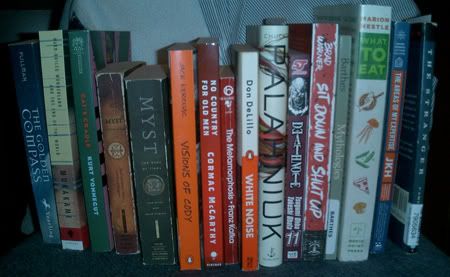
I won't go through the entire listing of this one, but take heed of the hot stuff like Camus, Kafka, and some new Palahniuk that, in truth, won't last the rest of the week let alone make it to Summer Reading. It's. So. Good.
Anyways, that should be it for books a while. I'll talk about video games again, like I promised.
Labels: Books, Fiction, Free Stuff, Literature, Summer Reading
Considering The Lathe of Heaven to be dystopian feels initially to be more of a stretch than saying the same of other works like 1984. This probably lies in the fact that the plot of 1984 centers upon a focus of realism, where The Lathe of Heaven explores science fiction. Just as in V for Vendetta, the entry of story elements like superhuman abilities removes much of the fear that the text would otherwise present. That’s not to suggest that the idea of someone who is capable of changing the world through dreams isn’t fearful, as this is shown very specifically in the case of Dr. Haber’s nightmare reality, but the notion itself is so outside our own society that it doesn’t lend itself particularly well to rationalizing dystopia in comparison to our cultural reality.
Texts like 1984 and The Iron Heel allow us the opportunity to view the progression of our own society in relation to those proposed within the works, but the inclusion of particularly outlandish things like aliens that appear to look like turtles and a world of gray people remove our own culture from the work, and act as a buffer for the dystopian world Leguin suggests. The relevancy is there, of course, just shadowed under laughs and feelings of distance from the events that occur.
Gray people as a solution to racism is an obviously important plea about the problem itself, just as a plague that solves the overcrowding of the world is a terrible solution to the issue, but relying upon the irrationality of dreams to solve these issues leaves the novel essentially without someone to blame. Haber is the culprit behind the manipulation of George Orr’s dreams, but as the book continually reminds the reader, his intentions are noble. Obviously, the same could be said for most totalitarian governments and despots who are seeking to improve the world, so in some way Haber assumes the role of imposing fear just as the totalitarian government in 1984, or the oligarchy in The Iron Heel. However, does the reader ever casually make that connection, or does Haber never feel as particularly threatening as The Party?
If he doesn’t, then why not? Perhaps the reader is reminded one too many times of how noble he is, or maybe the fact that Haber, while continually growing in power and significance in the multiple realities Orr creates, always remains tucked away in his office and removed from the world at large. He doesn’t become the President, or a living God in the eyes of the people, instead he remains unknown, simply shaping the course of reality. In actuality, once his position is closely examined, which is more fearful? The open dictatorship and propaganda of 1984, or the silent molding of society to the ideals of Dr. Haber?
Haber’s fear might have been more recognized if he used a more potent tool to shape reality than the dreams of George Orr. The single most deterring factor to comparing The Lathe of Heaven to a contemporary culture is that the dystopian element of society isn’t imposed by a realistic means. Dreams are irrational, and thus they are largely written off as a fearful means of proposing a future reality. They may only be the tool to which Haber applies his trade, but capitalism was the tool to the oligarchy, religion to Gilead, and technology to The Sprawl; these things resonate with us, and the dystopian worldviews they could bring about seem fearful because of it. They are culturally significant issues, whereas dreams, and shaping reality by them, are more a dream of their own.
Labels: Books, Coursework, Dreams, Dystopia, Fiction, Literature, Reviews, The Lathe of Heaven, Ursula Le Guin
Alan Moore explores dystopia within V for Vendetta in a very similar fashion as George Orwell in 1984. Both works establish a totalitarian regime in Great Britain, and both focus on a “future” world that, despite being history as of now, isn’t necessarily futuristic. The setting of both works is grounded in reality for the most part, and as such, inspires readers to believe that the resulting dystopias are more possible, and ultimately, more fearful.
It’s strange to assume that otherworldly and seemingly impossible things are less fearful than the familiar. However, through some byproduct of human reality, it is almost always the case that skewing the familiar is more unnerving than the fantastic. Not to leap away from the literature at hand, but this is very prevalent in the production of digitally animated films. For this reason, Disney, Pixar, and Dreamworks consecutively choose to employ a stylized look to all their creations, as opposed to something like The Polar Express, in which we notice that closeness to reality, and are immediately repelled by it. Animators and those working in robotics have noticed this phenomenon, and labeled it the Uncanny Valley. Literature isn’t foreign to the valley, and we see that in work like V for Vendetta and 1984. In short, the closer these works seem to reality, the more they frighten us, while the more fantastic elements they propose, the less threatening they seem.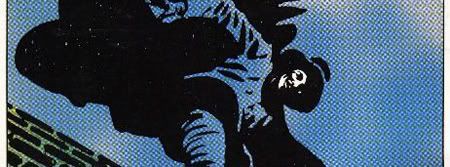
It’s particularly noticeable in the way in which we derive fear from V for Vendetta. So much of the resultant fear from reading the novel is directed at the totalitarian regime and fascism, the more realistic components of the work, that readers never identify V as an anti-hero, nor do they ever draw fear from the power and threat he poses to the human race. In his dialogue over the television broadcast V clearly proves the point that he defines himself as beyond human. He likens the human race to factory workers while he is the overseer, the management. This notion of an evolved being, even one that was created by human experimentation, is too fantastic to seem fearful, and as such, is written off by most readers.
It is in Alan Moore’s other most prominent work, The Watchmen, that he explores this fear alone. In a fictional world in which beings can have superpowers, humans are already facing an entirely different sort of dystopia than that of a totalitarian regime. This sort of dystopia is explored almost solely in the world of comic books and not literature, although The Lathe of Heaven, as far as I have inferred, seems to raise the question as well.
That isn’t to suggest that the totalitarian regime within V for Vendetta isn’t important. It just clearly isn’t the focus of the work. Moore never crafts a vastly threatening nation like the one present in 1984. This could have been intentionally done by providing the details of a fringe criminal society, a populace almost ready to be lead free by V, or a leader that is, while still somewhat threatening, a pawn to a machine, or it could simply be the result of poor writing. Moore may have wanted to suggest this government was vastly threatening, but the novels focus on V makes it seem otherwise. This is V’s vendetta. Is it against those who have imprisoned and experimented upon him, or is it against the entire human race? Through his death has he achieved victory by freeing the people, or by crushing his enemies? V’s actions seem noble in the face of those who are willing to topple a fascist regime, as we should all be, but is it acceptable to have a human society, of any kind, fallen under the throes of a being that views himself as better than human?
Labels: Alan Moore, comics, Coursework, Dystopia, Fiction, Graphic Novles, Literature, V for Vendetta
Within the last third of The Iron Heel, the novel finally breaks free from a seemingly realistic historical text and moves toward the dystopian domain. While the setup to this climax may have some dystopian elements, it is when the early 1900s society crumbles, and the oligarchy abandons what we would consider fair governmental practices, if we have the right to even suggest those, that a dystopia is fully realized. Prior to this we see what interestingly could be taken for history instead of the proposed future that London was writing about. Whether this comes four our lack of knowledge about the actual historical events in this time period, or from how culturally relevant these ideas and events seem to be, is something that could be debated. Regardless, what London suggested as the future we partially interpret as what could have been our past, so where does that leave us in comparison to the ultimate destination of society that London deemed the Brotherhood of Men?
Surely we haven’t yet reached a society as ideal as the one London suggested could come to power in 2200, but are we closer than he might have imagined, or is the oligarchy still in control? It’s hard to not suggest that the oligarchy doesn’t have some sort of control over society, even now. The truth that 1% of the world population controls 90% of the wealth is a genuinely potent example of how strongly capitalism has favored the select few, and it wouldn’t be outlandish to think that they’ve even gone farther than London imagined, by not attempting to impose a strict caste system and instead indoctrinating the belief that we should strive for that wealth, and that it is actually available to us, when realistically it isn’t. The class ladder is still used as a model to teach students that there is the low, middle, and upper classes, when it is evident to most that regardless of the naming and subdividing of the lower class, there is little more than the lower class, and the upper class – the oligarchy, of which migrating upwards to is impossible. This hidden truth that not everything is available to everyone, despite what they’ve been told time and time again, must be the most controlling aspect of our modern oligarchy. 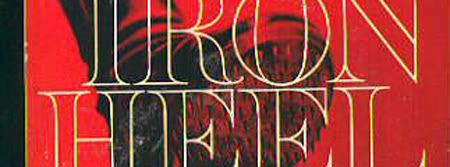
The Socialist revolution that The Iron Heel focused on never does occur, and even now it doesn’t seem particularly possible. If anything, a defeat of the modern oligarchy will come as most other things have seemed to occur, as a gradual waning towards something better. This is akin to what Ernest proposes as a kind of social evolution. Society moves forward by growing in the direction of something more habitable for all. The amount of our beliefs and opinions that are now in league with socialism, whether we know it or not, are proof of this. Unlike much of Ernest’s philosophy however, it seems rash to believe we’re incapable of moving backwards. Much can happen in a society to reduce it to something it had thought it surpassed. Human nature itself shows this flaw to be something we contain. In examples like the Abu Ghraib prison incident, and even more clearly in the Stanford prison experiment conducted by Dr. Philip Zimbardo, people have shown that all of societies imposed progress can be quickly rewritten.
Even with our slow crawl towards the wonder cities of The Iron Heel, that destination seems much farther off than the relatively close year of 2200. Much can happen in 200 years, but the amount of conflict still in the world is a depressing tie to modern times. The oligarchy, albeit a slightly different beast than what London proposed, is still in control, and the slow process of moving the course of society towards The Brotherhood of Men is currently drudging along.
The truly dangerous thought is that what if all of our progress toward a better and more civilized society isn’t actually the result of wearing down the oligarchy, but instead it is the freedoms that the oligarchy merely allows us to enjoy, in order for them to maintain their role as our prison wardens. This sort of deliberation and knowledge is reminiscent of how brilliantly The Iron Heel’s oligarchy squelched the first rebellion in Chicago, and it is a scary thought to consider how that could translate to today. If nothing else, we at least have the luxury of knowing that society hasn’t yet reverted to the very dystopian “future” that The Iron Heel proposed. We aren’t the same sort of slaves they had become, and luckily, we never did find it necessary to go as far as reinstating crucifixion. Thank goodness.
Labels: Books, Coursework, Dystopia, Fiction, Jack London, Literature, Reviews, Socialism, The Iron Heel



